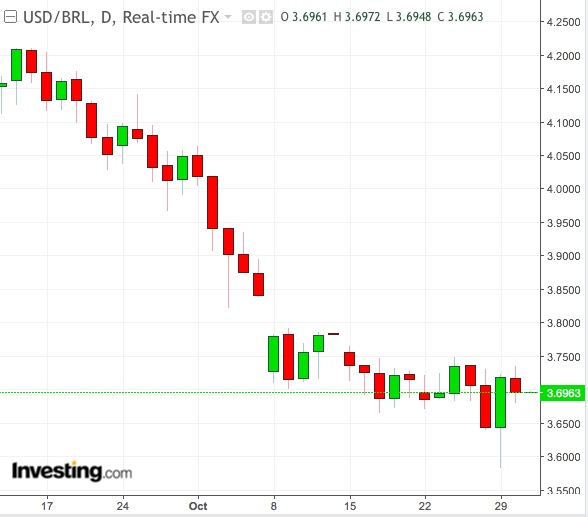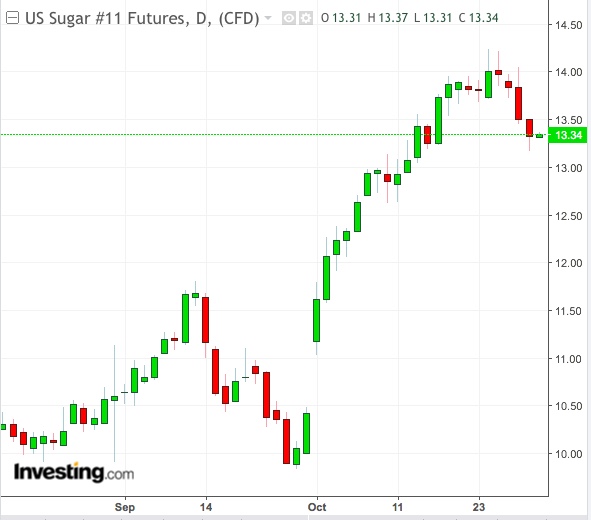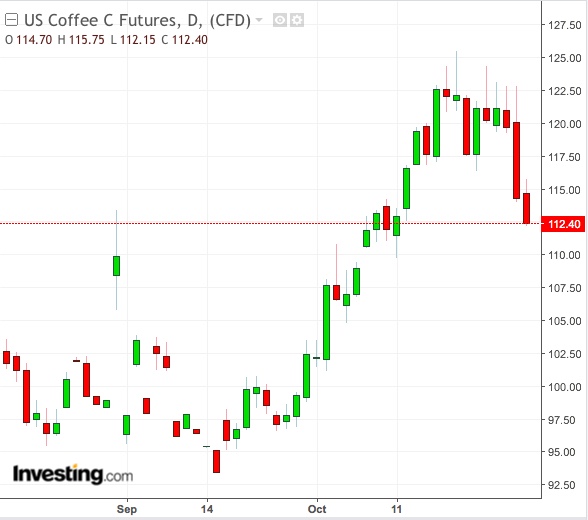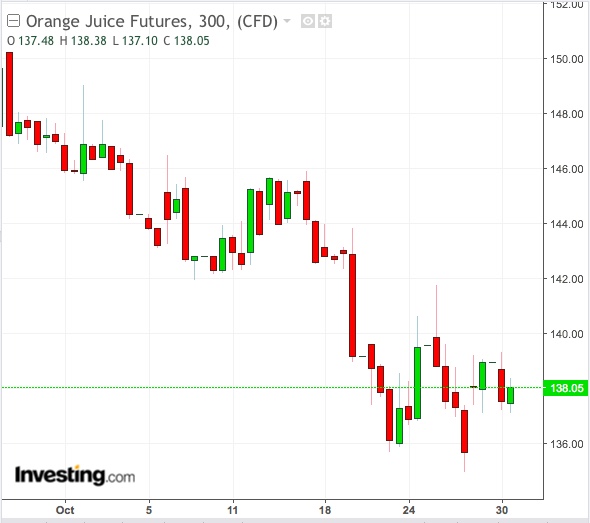Jair Bolsonaro’s honeymoon as Brazilian president has just begun. Yet his campaign’s courtship of the country’s commodity markets may have ended even before he swept into office this week.
New York-traded futures of raw sugar, arabica coffee and orange juice—all major Brazilian exports—have fallen sharply over the past two weeks, after rallying earlier in the month when Bolsonaro emerged as front-runner for the South American country’s presidential election.
The fortunes of the three commodities turned even before that of the real—the local currency that drove their prices up in stages from as early as mid-August. Brazilian farmers price their harvests in the real, converting them to the dollar value, which evolves as those commodities reach the international market.
Real Still Strong, Not So Brazil’s Commodities

The real rallied for six straight weeks through last Friday, just before Bolsonaro’s win on Sunday. After a bout of profit-taking on Monday, the currency was back up on Tuesday on continued euphoria over the former army captain’s pledges to economically reform the corruption and crime-ridden nation.
Technical analysts at Seery Futures in Plainfield, Illinois, and ADM Investor Services (ADMIS) in Chicago do not see immediate buy signals for Brazil’s top three commodities. Investing.com also has mixed recommendations of “Neutral,” “Sell” and “Strong Sell.”
Mike Seery, who heads Seery Futures, says charts suggest that prices of sugar and arabica in particular had topped out in their recent run higher. “I think they are in extremely overbought situations,” Seery said, adding that fundamentals did not suggest the two markets could revisit those peaks in the near term.
50% Retracement From Peaks Seen For Sugar

Sugar was the first of the three to rally, with intermittent spikes beginning as early as the week ending August 17. It hit a two-week low of 13.17 cents a lb on Tuesday, culminating in four straight days of losses. Just a week ago, sugar peaked at 9-1/2 month highs of 14.24 cents. Said Seery:
“I think sugar prices could trade back all the way down to around the 13 cent level as we rallied almost 350 points in October, which was remarkable in my opinion. It would not be surprising to see some profit-taking as the 50 percent retracement level would be around the 12.50 level.”
ADMIS has a similar downside target of 13.03 cents for sugar, saying: “Momentum studies are trending lower from high levels, which should accelerate a move lower.”
Investing.com has a “Neutral” recommendation on sugar.
More Downside For Arabica After 8% Slide

Arabica has fallen 8 percent in the past two weeks after rallying more than 25 percent in the previous five weeks. From Tuesday’s last trade of $1.1245 per lb, arabica could drop to the Oct 11 low of around $1.09, Seery said. He added:
“I have been advising that if you were in a long futures position to take profits, as I think prices have topped out in the short term.”
ADMIS suggests an ultimate support of around $1.07, saying coffee’s “intermediate trend has turned down, with the cross over back below the 18-day moving average.”
Investing.com has a “Sell” recommendation on arabica.
Orange Juice Most Volatile
Orange juice has been the most volatile of Brazil’s top commodities, with intermittent moves lower even when rallying in the run-up to Bolsonaro’s election.

On Tuesday, juice last traded at $1.3555 a lb, staying flat for this week after losing a total of 3 percent in two prior weeks. The commodity was also on track to end October 6.5 percent lower. Said Seery:
“I think prices could trade as low as $1.20 in the coming days as there is nothing bullish fundamentally, or technically, speaking, about the orange juice market at this time.”
That outlook, however, jars with the forecast of agricultural commodities expert Shawn Hackett, who argues that the Brazilian currency is only one aspect of the recent strength in juice, with the other being the South American nation’s relevance as a back-up citrus provider to the key US orange state of Florida.
Hackett says in his latest note that orange juice futures tend to bottom in mid-October and rally into December on Florida frost fears. This year, Brazil also has extensive crop damage from weather that could result in its orange juice stocks being the smallest in over 20 years, he cautioned.
Investing.com, meanwhile, has a “Strong Sell” recommendation on juice.
